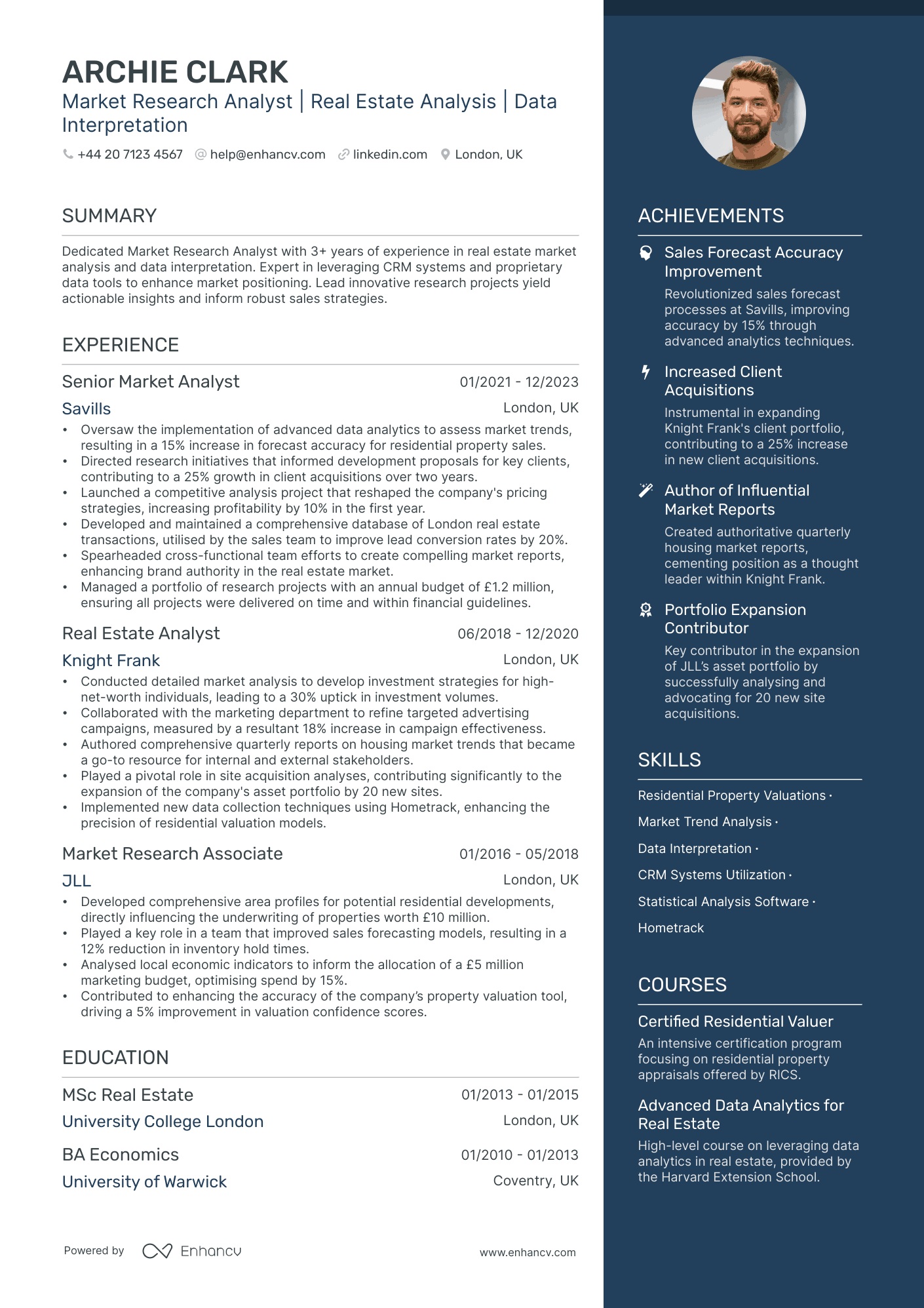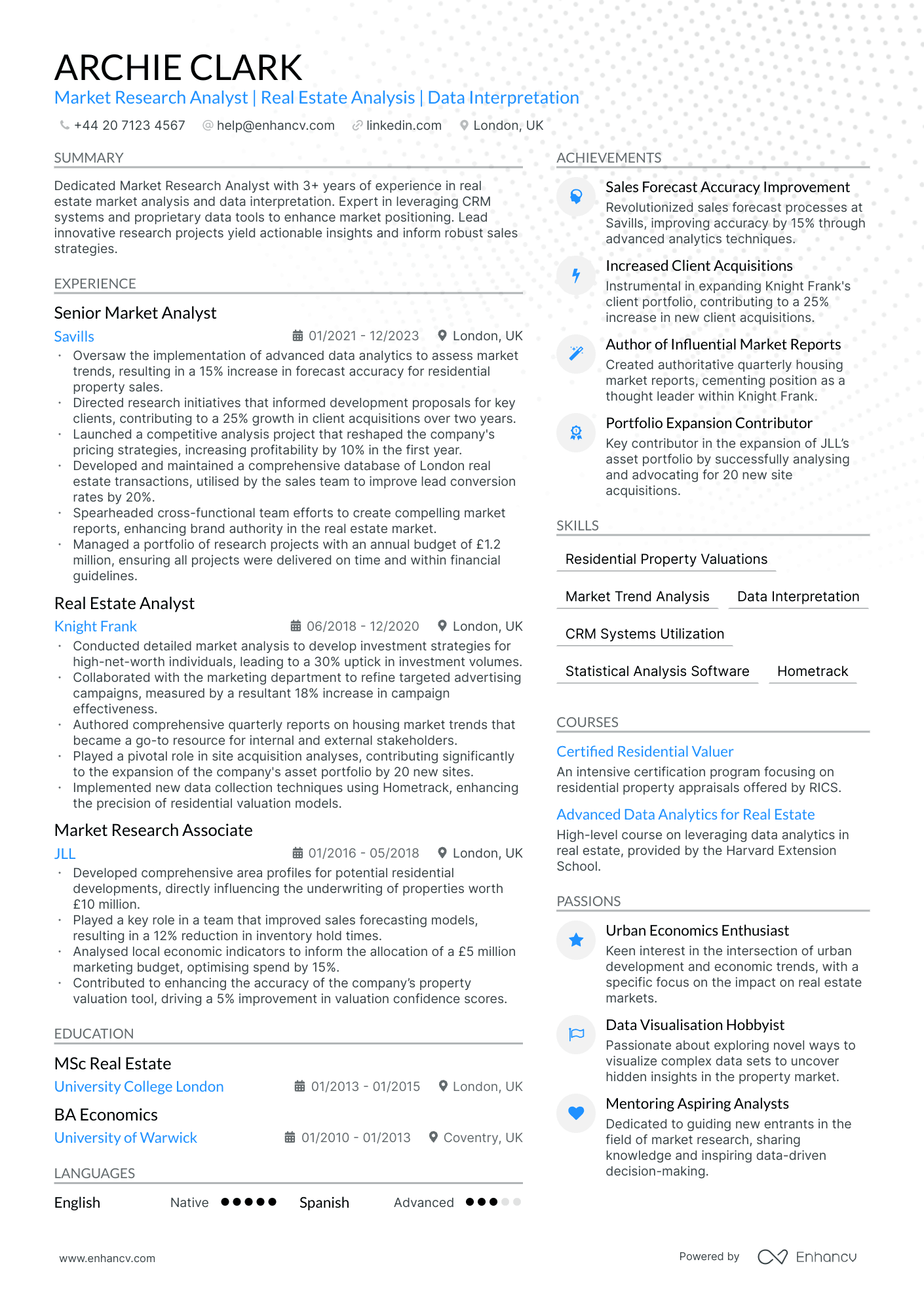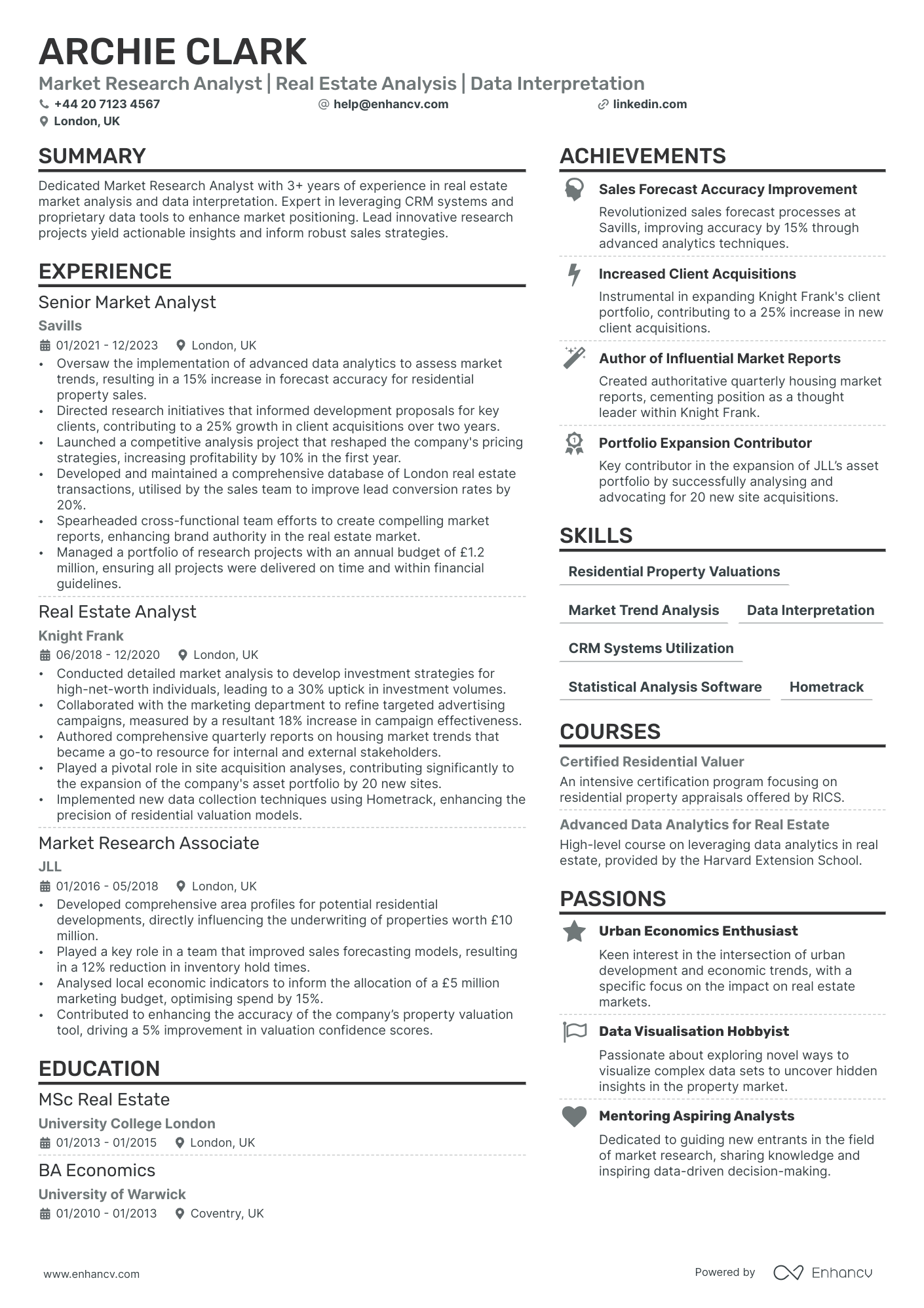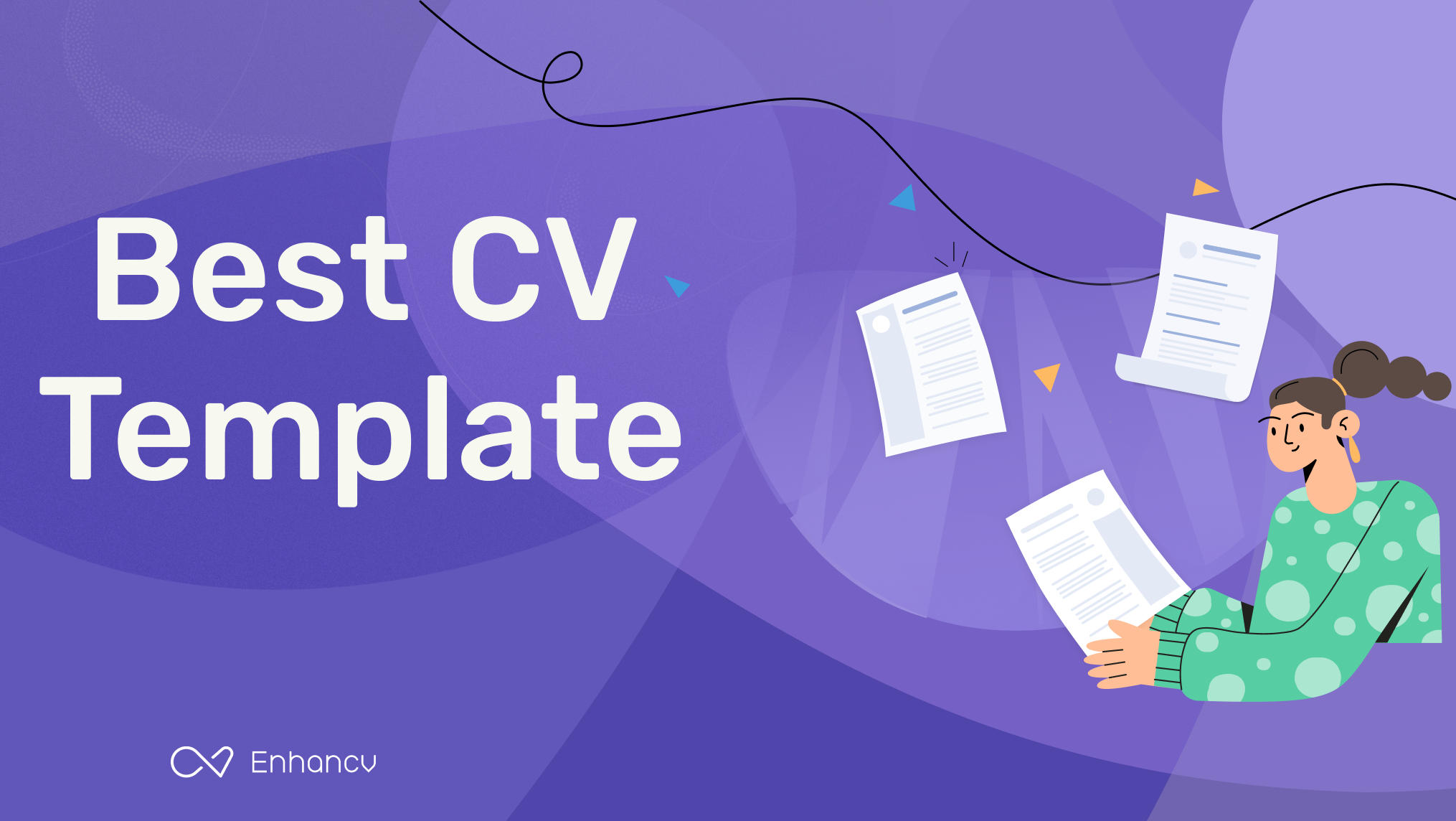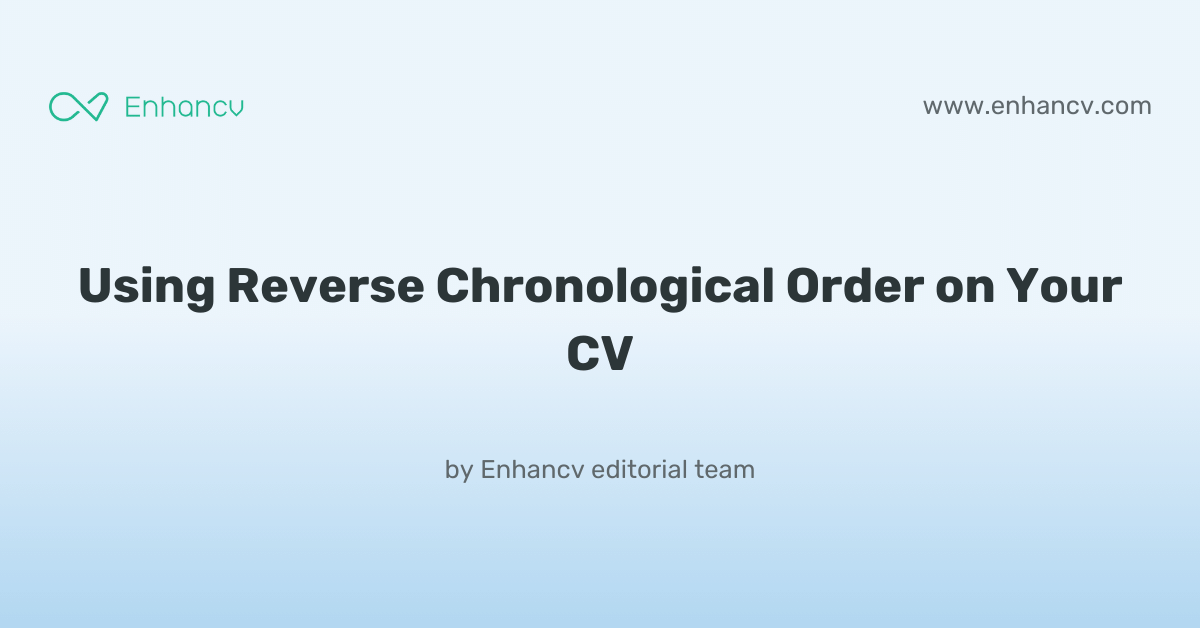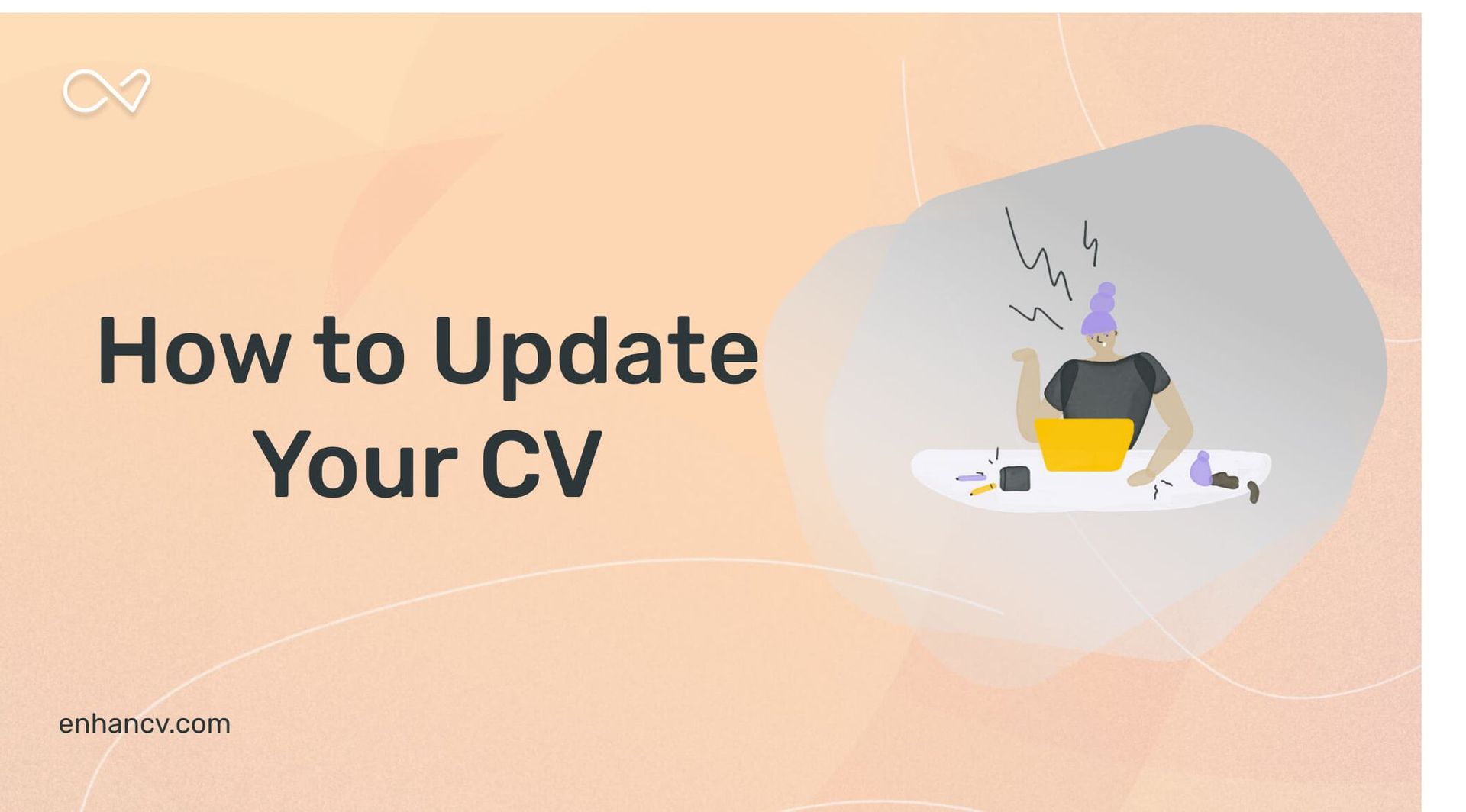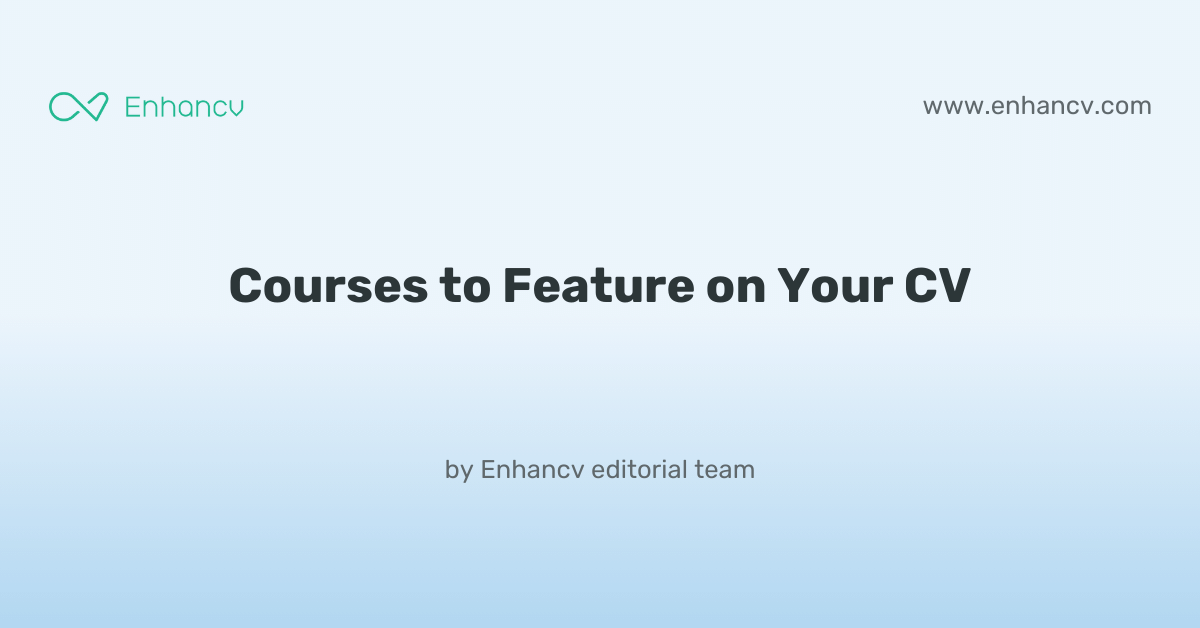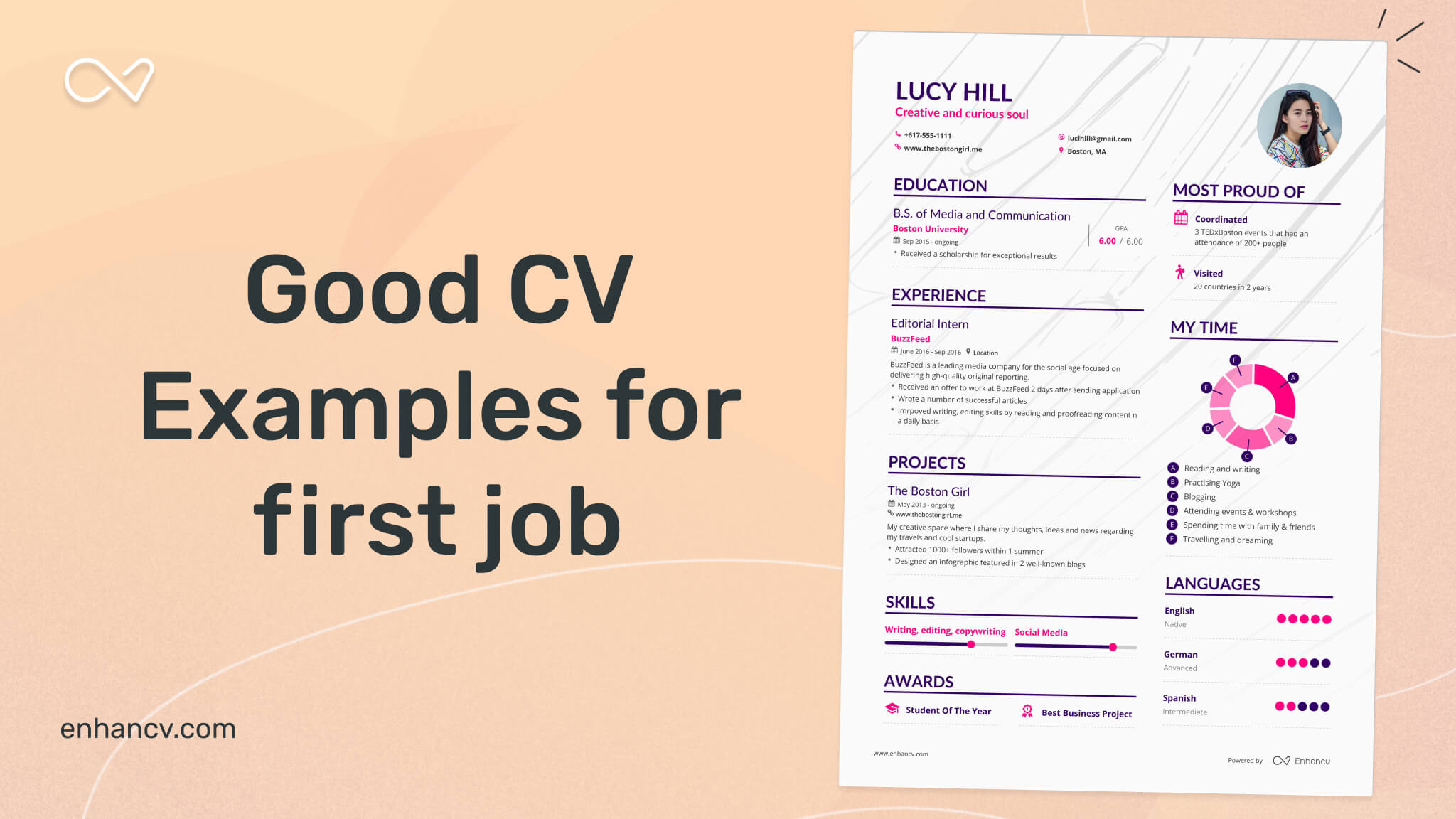One specific CV challenge in market research is effectively parsing and analysing unstructured data from various sources. By utilising our comprehensive guide, you'll learn how to leverage advanced CV algorithms to efficiently convert visual information into actionable insights.
- Answer job requirements with your market research CV and experience;
- Curate your academic background and certificates, following industry-leading CV examples;
- Select from +10 niche skills to match the ideal candidate profile
- Write a more succinct experience section that consists of all the right details.
Do you need more specific insights into writing your market research CV? Our guides focus on unique insights for each individual role:
- Environmental Consultant CV Example
- Senior Business Analyst CV Example
- Entry Level Business Analyst CV Example
- Compliance Manager CV Example
- Strategy Consultant CV Example
- Relationship Manager CV Example
- Manager CV Example
- Business Development CV Example
- Investment Manager CV Example
- Business Intelligence CV Example
Formatting your market research CV to meet the role expectations
Staring at the blank page for hours on end, you still have no idea how you should start your professional market research CV. Should you include more colours, two columns, and which sections? What you should remember about your CV format is this - ensure it's minimalistic and doesn't go over the top with fancy fonts and many colours. Instead, focus on writing consistent content that actually answers the job requirements. But, how about the design itself :- Use the reverse chronological order to showcase your experience, starting with your most recent role;
- Include your contact details (email address, phone number, and location) - and potentially your professional photo - in the header;
- Must-have CV sections include summary or objective, experience, education, and skills: curate the ones that fit your profile;
- Your professional market research CV should be between one-to-two pages long: select the longer format if you have more experience.
A little bit more about your actual CV design, ensure you're using:
- plenty of serif or sans serif font (e.g. Montserrat, Exo 2, Volkhov) as they are Applicant Tracker System (ATS) compliant. Avoid the likes of Arial and Times New Roman because most candidates' CVs are in this typography.
When submitting your CV, are you still not sure what format it should be? Despite the myth that has been circling around, most modern ATS systems are perfectly capable of reading PDFs. This format is an excellent choice as it keeps all of your information intact.
PRO TIP
Be mindful of white space; too much can make the CV look sparse, too little can make it look cluttered. Strive for a balance that makes the document easy on the eyes.
The top sections on a market research CV
- Professional Summary showcases your expertise in market analysis and research methodologies.
- Market Research Experience highlights previous roles and specific projects you worked on.
- Research Skills and Tools section demonstrates proficiency with relevant software and techniques.
- Education and Qualifications covers your formal training in market research or related fields.
- Relevant Certifications lists any special credentials that set you apart in the field of market research.
What recruiters value on your CV:
- Highlight your analytical skills by mentioning specific projects where you successfully identified market trends and consumer preferences to drive business strategies.
- Emphasise any experience with statistical software and data analysis tools such as SPSS, R, or Python, showcasing your ability to draw actionable insights from complex data sets.
- Include specific methodologies you're proficient in, such as qualitative and quantitative research, focus groups, and surveys, detailing how these methods contributed to informed decision-making in previous roles.
- Feature any sector-specific knowledge you possess, for example, expertise in fast-moving consumer goods (FMCG) or technology markets, demonstrating your ability to navigate and analyse the nuances of these industries.
- Present your communication expertise by illustrating how you've successfully translated complex data into clear, persuasive reports and presentations to stakeholders and decision-makers.
Recommended reads:
Tips and tricks on writing a job-winning market research CV header
The CV header is the space which most recruiters would be referring most often to, in the beginning and end of your application. That is as the CV header includes your contact details, but also a headline and a professional photo. When writing your CV header:
- Double-check your contact details for spelling errors or if you've missed any digits. Also, ensure you've provided your personal details, and not your current work email or telephone number;
- Include your location in the form of the city and country you live in. If you want to be more detailed, you can list your full address to show proximity to your potential work place;
- Don't include your CV photo, if you're applying for roles in the UK or US, as this may bias initial recruiters' assessments;
- Write a professional headline that either integrates the job title, some relevant industry keywords, or your most noteworthy achievement.
In the next part of our guide, we'll provide you with professional CVs that showcase some of the best practices when it comes to writing your headline.
Examples of good CV headlines for market research:
- Market Research Analyst | Qualitative Methodologies | MSc in Data Analytics | 5+ Years' Experience
- Senior Research Executive | FMCG Specialist | Consumer Insight | BSc Sociology | 10 Years' Expertise
- Quantitative Research Manager | Data Modelling | Market Segmentation | CIM Certified | 7 Years in Field
- Consumer Insights Specialist | Brand Strategy Development | MA Marketing | 6 Years' Professional Practice
- Lead Market Analyst | Competitive Intelligence | Product Lifecycle Analysis | PhD in Market Research | 12 Years
- Junior Data Researcher | Survey Design | Statistical Analysis | BA Business Studies | 2 Years' Exposure
Your market research CV introduction: selecting between a summary and an objective
market research candidates often wonder how to start writing their resumes. More specifically, how exactly can they use their opening statements to build a connection with recruiters, showcase their relevant skills, and spotlight job alignment. A tricky situation, we know. When crafting you market research CV select between:
- A summary - to show an overview of your career so far, including your most significant achievements.
- An objective - to show a conscise overview of your career dreams and aspirations.
Find out more examples and ultimately, decide which type of opening statement will fit your profile in the next section of our guide:
CV summaries for a market research job:
How to meet job requirements with your market research CV experience
We've now reached the essence of your actual CV - your experience section. This is the space where you can list your career roles and on-the-job successes. Many candidates tend to underestimate just how much time and effort they should put into writing this CV section. Your experience shouldn't be a random list of your responsibilities, but instead:
- Match the job description with your skills, values, and accomplishments;
- Start each bullet with a strong action verb, followed up with one key skill and your outcome of applying this skill;
- Spotlight parts of your career history that are relevant to the job you're applying for.
Before we move on, make sure to check out some professional CV experience sections.
Best practices for your CV's work experience section
- Designed and executed qualitative and quantitative market research projects, utilising tools such as surveys, focus groups, and statistical analysis to gather robust data and insights on consumer behaviour and market trends.
- Leveraged advanced analytics software, including SPSS and SAS, to interpret complex datasets, providing actionable recommendations that informed product development and marketing strategies.
- Managed cross-functional teams across projects, demonstrating strong leadership skills and ability to collaborate effectively with stakeholders from marketing, sales, and product development departments.
- Conducted competitor analysis reports to identify market opportunities and threats, presenting findings to senior management that directly influenced business strategies.
- Utilised strong communication skills to present research findings, translating complex data into clear, impactful presentations and reports to support decision-making processes.
- Developed and maintained research databases, ensuring high data quality and compliance with GDPR and other relevant data protection regulations.
- Continuously monitored emerging market trends and consumer preferences, using insights to forecast market shifts and advise on potential impacts on the company's product lines.
- Engaged with customers and industry experts through in-depth interviews and trade shows to validate research findings and hypotheses, strengthening the credibility of research outcomes.
- Authored white papers and articles on market insights, establishing thought leadership in the industry and contributing to the company's external visibility and credibility.
- Conducted comprehensive market segmentation and competitive analysis for a new product launch, leading to a successful market entry that captured 10% market share within the first year.
- Implemented a customer satisfaction tracking system that provided actionable insights, driving product improvements and a 15% increase in overall customer satisfaction ratings.
- Managed a team of 5 market researchers to execute a large-scale brand perception study, which informed a rebranding strategy and led to a 20% increase in brand recognition.
- Pioneered a data mining initiative to identify emerging market trends, resulting in the introduction of 3 high-demand products and a 25% growth in sales.
- Developed and presented quarterly trend reports to senior management, providing insights that shaped strategic marketing decisions.
- Collaborated with cross-functional teams to design and execute a customer loyalty study, which enhanced retention strategies and reduced churn by 8%.
- Leveraged advanced analytics tools to evaluate consumer behavior patterns, identifying key drivers that increased ROI on marketing campaigns by 35%.
- Piloted a social media sentiment analysis project that informed content strategy, leading to a 50% boost in online engagement.
- Crafted a comprehensive market entry strategy for the Asian market, facilitating a smooth launch and exceeding sales projections by 15% in the first quarter.
- Orchestrated a strategic partnership with an analytics software company to enhance research capabilities, thus streamlining the research process and cutting costs by 10%.
- Directed the collection and analysis of consumer feedback for a major product overhaul, which led to a design revamp and a subsequent 18% improvement in product ratings.
- Initiated a targeted customer engagement survey which identified key areas for service improvement and contributed to a 12% uplift in customer retention.
- Masterminded an industry benchmarking study that provided clients with vital metrics against competitors, enhancing the consultancy’s value proposition and client satisfaction.
- Devised a survey methodology that improved response rates by 25%, yielding more reliable data for strategic decision-making.
- Fostered a collaborative research approach with the sales team that pinpointed market opportunities, leading to a targeted campaign and a 20% rise in qualified leads.
- Led a digital consumer behavior study utilising cutting-edge technology to track online purchase patterns, contributing to an e-commerce strategy that saw a 30% surge in online sales.
- Designed a predictive model for product success that was integral to the development pipeline, accurately forecasting performance for 5 consecutive product launches.
- Cultivated a comprehensive voice of the customer program that harmonized feedback across multiple channels, significantly improving product alignment with customer needs.
- Conceived and executed an international market expansion study, which identified three high-potential regions and guided a tailored marketing approach, increasing global reach by 12%.
- Transformed raw data into strategic insights through advanced statistical analysis, enabling data-driven decisions that led to a 22% efficiency increase in marketing spend.
- Orchestrated a company-wide training program on market research techniques and tools, enhancing the internal team’s capabilities and productivity by 15%.
- Developed a custom research dashboard for real-time market data analysis, which became the cornerstone for rapid insights generation and contributed to a 40% reduction in decision-making time.
- Executed a disruptive technology adoption study that was vital in positioning the company as a thought leader, attracting a 20% increase in client consultations.
- Coordinated with the product development team to embed market insights into the design process, resulting in product features that boosted customer satisfaction by 15% and market share by 5%.
Writing your CV without professional experience for your first job or when switching industries
There comes a day, when applying for a job, you happen to have no relevant experience, whatsoever. Yet, you're keen on putting your name in the hat. What should you do? Candidates who part-time experience , internships, and volunteer work.
Recommended reads:
PRO TIP
Talk about any positive changes you helped bring about in your previous jobs, like improving a process or helping increase efficiency.
Describing your unique skill set using both hard skills and soft skills
Your market research CV provides you with the perfect opportunity to spotlight your talents, and at the same time - to pass any form of assessment. Focusing on your skill set across different CV sections is the way to go, as this would provide you with an opportunity to quantify your achievements and successes. There's one common, very simple mistake, which candidates tend to make at this stage. Short on time, they tend to hurry and mess up the spelling of some of the key technologies, skills, and keywords. Copy and paste the particular skill directly from the job requirement to your CV to pass the Applicant Tracker System (ATS) assessment. Now, your CV skills are divided into:
- Technical or hard skills, describing your comfort level with technologies (software and hardware). List your aptitude by curating your certifications, on the work success in the experience section, and technical projects. Use the dedicated skills section to provide recruiters with up to twelve technologies, that match the job requirements, and you're capable of using.
- People or soft skills provide you with an excellent background to communicate, work within a team, solve problems. Don't just copy-paste that you're a "leader" or excel at "analysis". Instead, provide tangible metrics that define your success inusing the particular skill within the strengths, achievements, summary/ objective sections.
Top skills for your market research CV:
Data Analysis
Statistical Software Proficiency
Survey Design
Market Intelligence Gathering
Quantitative Research
Qualitative Research
Data Visualization
Report Writing
Competitive Analysis
CRM Software Proficiency
Critical Thinking
Communication
Problem-Solving
Attention to Detail
Time Management
Adaptability
Teamwork
Creativity
Decision-Making
Project Management
PRO TIP
Focus on describing skills in the context of the outcomes they’ve helped you achieve, linking them directly to tangible results or successes in your career.
Education and more professional qualifications to include in your market research CV
If you want to showcase to recruiters that you're further qualified for the role, ensure you've included your relevant university diplomas. Within your education section:
- Describe your degree with your university name(-s) and start-graduation dates;
- List any awards you've received, if you deem they would be impressive or are relevant to the industry;
- Include your projects and publications, if you need to further showcase how you've used your technical know-how;
- Avoid listing your A-level marks, as your potential employers care to learn more about your university background.
Apart from your higher education, ensure that you've curated your relevant certificates or courses by listing the:
- name of the certificate or course;
- name of the institution within which you received your training;
- the date(-s) when you obtained your accreditation.
In the next section, discover some of the most relevant certificates for your market research CV:
PRO TIP
Order your skills based on the relevance to the role you're applying for, ensuring the most pertinent skills catch the employer's attention first.
Recommended reads:
Key takeaways
Impressing recruiters with your experience, skill set, and values starts with your professional market research CV. Write concisely and always aim to answer job requirements with what you've achieved; furthermore:
- Select a simple design that complements your experience and ensures your profile is presentable;
- Include an opening statement that either spotlights your key achievements (summary) or showcases your career ambitions (objective);
- Curate your experience bullets, so that each one commences with a strong, action verb and is followed up by your skill and accomplishment;
- List your hard and soft skills all across different sections of your CV to ensure your application meets the requirements;
- Dedicate space to your relevant higher education diplomas and your certificates to show recruiters you have the necessary industry background.
